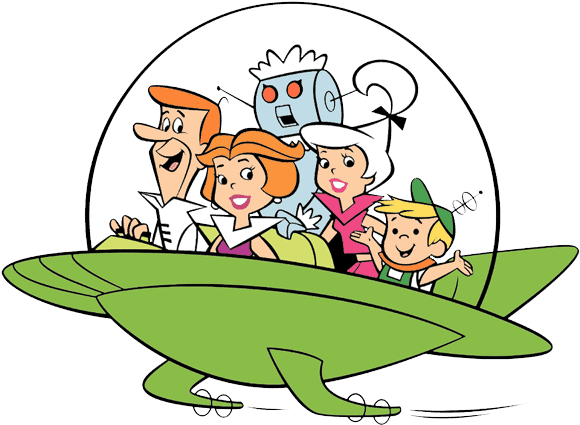Growing up, I loved watching reruns of The Jetsons, an animated sitcom set in the space age. Seeing a futuristic family like mine flying around in space cars and living in a place like “Orbit City” felt unimaginable—but it gave me, and countless others, hope for a technological future that once seemed far off.
In the show, homes and businesses were raised high in the sky, connected to the ground by tubes with chairs that transported people in and out. Floors moved so you didn’t have to walk much. The Jetsons had a kitchen with appliances that cooked and served food on demand, a robotic maid named Rosie, a flying car, and other futuristic conveniences. George Jetson even walked Astro, their family dog, on a treadmill inside their home.
When someone placed a call, instead of answering a telephone, the recipient would press a button on a wall-mounted television and the caller would appear onscreen. That seemed so wild and futuristic at the time. Who would have thought that video calling would not only become a reality within our lifetimes—but something we now do every day? Between Teams and Zoom meetings, FaceTime, and similar platforms, video communication has become second nature.
In November 1995, Bill Gates appeared on The Late Show with David Letterman. Letterman asked Bill about his vision for computers, and Gates replied that he envisioned a computer on every work desk and in every home.
Then Letterman asked, “What about this Internet thing? What is that?” Gates explained, “It’s become a place where people are publishing info,” and added that companies were starting to use it, too. Letterman then joked about a “breakthrough announcement” that a baseball game would be broadcast on the Internet and could be listened to on a computer. “And I thought, does radio ring a bell?” he quipped. The audience roared with laughter and started clapping, and even Gates chuckled.
That clip feels like a lifetime ago, yet even today we laugh at technological advances that once seemed inconceivable—like AI, which only recently entered the mainstream. Maybe sometime soon you and I—and our families—will be flying around in space cars, living and working in the sky, and relying on robotic maids to manage our homes. And maybe our contract managers will soon be issuing RFPs for space cars, maid services, and sprockets.
Who knows? It’s nothing to roar with laughter about.


Let’s get logged in. Need to see what six6slogin is all about. Gonna go ahead and click this six6slogin link!